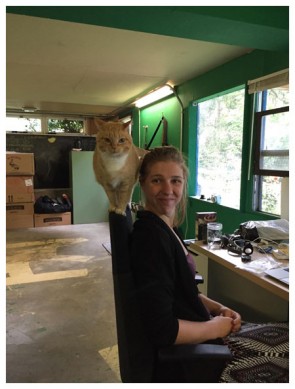BLOG — Getting real with real estate, part 1
- Published: October 7, 2015
This week and next will feature interviews with area real estate agents. I know as little as the next person when it comes to buying or selling houses, and the same could be said for Erica when she started working at an area real estate agent’s office. As is the case for many people in the area, jobs open up and people take them, learning a new industry they may not have thought they ever would.
It makes sense to start from the ground up (pun semi-intended) – Erica runs the behind-the-scenes operations of the office itself. She said she doesn’t have a lot to do with the actual buying or selling of a home, and I contend that her work at the office certainly makes the process smoother. A conversation with the agents themselves will be posted next week. Having somewhere to live is something many people take for granted, but once you go through the process of becoming a homeowner, I doubt that anyone will be able look at their home (or any other) in the same way again.
I don’t even know how to explain my job because I do so many random things. My role is essentially doing everything the realtors say. When a realtor needs something done – an email written, a contract sent over – and it’s my job to do it. I’m the person that organizes everybody. I try to keep the realtors organized; give them daily and weekly updates on what’s going on. Honestly, it’s a lot of admin stuff.
If somebody comes to you and says they want to sell their house, they have a bunch of papers they have to fill out – they have to sign an exclusive right to sell, a residential property disclosure, for example – and the realtor gets it all signed and gives it to me. Each realtor will have me put a contract together and mail it to their clients.
I make spreadsheets to keep things organized. I make flyer-box cards, which lets me leave the office. I do a little bit of marketing because I manage the Facebook page. I built the Facebook page and do the posts on it. And I made a bunch of email templates. I put all the open house stuff up online. There’s an art gallery in the office when you walk in, and I help with that. I talk with the artists and have them bring their stuff in. I like that.
I was helping to write the descriptions of the houses for a little bit. But I never went in the houses so that made it complicated because I would base my descriptions off of pictures. They would look like cherry cabinets and wood floors, and I’d write cherry cabinets and wood floors in a listing. But it wouldn’t actually be cherry and the floor would be something else. So one of the main realtors quickly started doing that. (Laughs)
I’ve also developed an operations manual for the person that’s going to replace me because I didn’t really know how to do anything at first. I was asking the realtors a lot of questions. The manual goes through everything from scheduling photos to how to list house online to scheduling the home stager. (A home stager is a contractor that goes to a house and makes it perfect, because people like going to a house and seeing it done up nicely.) The company had a manual but I wanted to make one that was online and had a bunch of hyperlinks so you could click on something in the Table of Contents and know how to send a contract to a buyer or seller right away, for example.
I’ve done a lot of six-, eight-month jobs, just testing out the water. I like jumping from job to job. You get to try different things and build new skills. I worked in Yellowstone tracking bison, I taught an undergrad class, I was a research assistant at George Mason and at Wright State, I was a certified nursing assistant. I’ve done some administrative work.
Here, the job fit with some of my background – I have an MBA. There are not that many jobs here for people that have graduated college, and I was very much looking for one. I needed a job and an opportunity presented itself. It was extraordinarily nice of the company to offer me the job without much background at all [in the realty field].
At one point I had no idea what a realtor did. I knew a realtor existed and you had to go through one to get a house, but I didn’t know anything. (Laughs) I didn’t know what the process was when I began. I’ve worked there since March, around seven months. It took about a month to go from not knowing anything about the real estate business to knowing how what to do with the contracts.
The players in the game are the buyer, the seller, the buyer’s agent, the seller’s agent; you have the title company and the mortgage company, and you have all of those people working together and trying to sell a house. And you have me there as a transaction coordinator.
A buyer will have an agent and the seller will have their own agent. They’re negotiating with each other. A buyer puts an end date in the contract, and the seller has to accept it or make a counter-offer by a certain time. It goes back and forth until they agree on a price. It gets immensely complicated because the buyer has to email his agent who will email the seller’s agent who will email her client, to just get one point across.
Then they go through inspections – they have written in the contract that you have fifteen days to do inspections and present a report. The parties negotiate back and forth to reach a consensus about how much the seller and buyer wants to pay to have things fixed up. It could be something like the slab of a house being cracked or a water leak, and sometimes it’s as specific as chipped paint or something broken on a door. After that, once they come to an agreement, you have go to closing, which deals with the title and mortgage companies.
The time it takes to sell a house, from beginning to end, depends. It depends on location, the state of the house, and if it’s a good price. A lot of the time the seller thinks their house is worth a lot more than it may actually be worth. They’ll have it at a high price and no one will come look at it because it’s out of reach. Realtors try to give sellers a good idea of what a house is worth. This is what houses in the neighborhood are selling for – your house has these updates which might make it worth a little more but generally you want to stay in the average price of the neighborhood.
We just listed a house yesterday in the lower 100K range and people are already looking at it. There aren’t a lot of places to live in Yellow Springs, so when there’s a cheap house, people jump at the opportunity. Houses that would probably be in the mid-to-high 100K range outside of Yellow Springs would be in the mid-to-high 200K range in town. Yellow Springs is a very high-demand market and it’s expensive. People want to live here and be part of the community.
Our group isn’t just a group that represents buyers, it represents sellers too. We consult with sellers, like this house should be cleaned or you need to do this [in order to sell it]. They even have someone that will go to a house and clean it and make it presentable. If there’s anything out of place or there’s even a small mess, [prospective buyers] don’t like it.
If you IKEA your home, people really like that. One home, they didn’t really do anything special, they did cheap, minor IKEA updates and it sold really quickly. Doing superficial updates really helps. A lot of people don’t want a fixer-upper – they just want to move it and be done with it.
How has the real estate market made me reflect on the larger world? Real estate is a business. It’s very much money-focused and money-driven – you’re selling people houses. Realtors are paid by commission. I noticed when I went to the Greene County Auditor that everything is separated into land that people own. You’re building houses and developments and more houses – it’s very much a business-business. It’s beneficial for people but not too beneficial for anything else. I guess most businesses are like that though, because they are trying to sell a product, no matter what the product is. Things are built, no matter how sustainable things are.
When someone wants to buy a house, it makes people seem very superficial, like you need a house and a large house and pretty house. A lot of time people don’t appreciate the agent’s time and effort and they just want what they want. Agents get called a 2 a.m. because a buyer or seller needs something done.
But it’s nice when someone closes on their house – they’re really excited and it’s a really big deal to go through this process and finally have your house sell. It’s also interesting talking to different people and people at different stages in their lives. I remember this couple, they were seventy years old, and they bought their first house. A lot of people are coming back to the area and people just starting out their lives. A lot of different people from different walks of life, who all want to stay here.
I don’t know if I want to own a home. Owning a home very much puts you in one place. It’s a commitment. And you have to go through the process of selling a home if you want to leave. I don’t want to own a home anytime soon. I like renting, but renting asks a lot too because you have to sign a year’s lease. I guess that’s why I’m house-sitting. (Laughs)
The Yellow Springs News encourages respectful discussion of this article.
You must login to post a comment.
Don't have a login? Register for a free YSNews.com account.













No comments yet for this article.